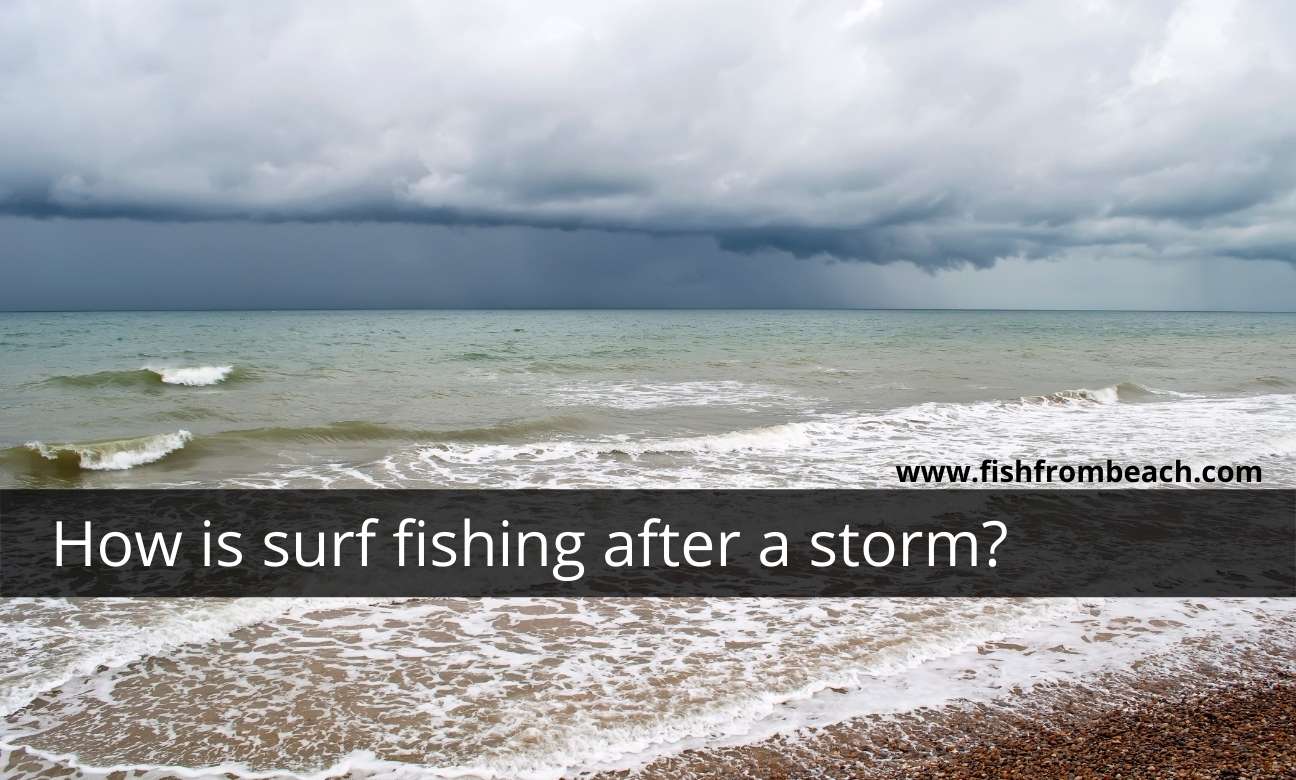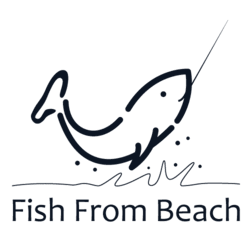
Surf fishing after a hurricane can be quite undesirable.
I mean, in addition to the unstable conditions that can discourage even the most avid anglers from packing their gear and heading for the beach, the stormy weather also leaves a lot of questions in the minds of surf fishermen:
- Do fish approach and hold in the surf area in the days following a hurricane?
- How is their appetite during this time? Will they hit my baits?
- Can I expect the same bite ratio as in the normal days?
- Will I get a good catch score without changing anything in my game?
All these questions are totally legit. After all, the weather after a hurricane can be quite unpleasant and off-putting, and it’s very normal to wonder if it’ll be worth it to pack the surf gear and go fishing.
But let me bring you some good news. The answer to all of the above questions is a big and bold YES.
Surf fishing after a hurrican is worth it and can be very rewarding.
In this article, we will discuss 5 reasons why you should try fishing off the beach in the first few days following a storm and why skipping these days can mean missing out on a lot of fun and memorable fights.
So without further ado, let’s dive in.
1- More food in the surf zone
Fish find a good food supply in nearshore waters after sormy days.
There are multiple reasons for this.
First of all, strong currents and choppy water conditions stir up the seabed and expose the nutrients and food elements buried under the sand. This includes sand fleas, invertebrates, and all the other tiny lifeforms that fish feed on.
The second source of food after hurricanes is what is left by waves when they crash into the rocks, and pull with them all kinds of baits from crustaceans, crabs, sea snails, etc.
Another reason why fish find more nutrition in the surf area after storms is what the rain brings to them from the valleys, passes, and estuaries that are directly connected to the sea.
And by the way, the best place to surf fish after a storm is near these kind of freshwater waterways. Fish are likely to concentrate around the mouths of these passes and wait for the food carried by the rain.
However, note that it’s probably a good idea to release most of your catches in such places. Why? Because the rain doesn’t only bring food to the fish, but also carries a lot of oils, chemicals, polluants, and toxic substances to the sea. You don’t want to put such things on your dinner table.
2- Atmospheric pressure back to normal
The days after a hurricane not only provide more food for the fish, but also make them more comfortable to eat.
The thing to know here is that stormy weather is often associated with low air pressure, which is known to be uncomfortable for most fish as it makes them sluggish, lethargic, and too lazy to search for food.
Thus, during a hurricane, fish either spend their time motionless in their shelter and save energy to survive the storm, or move offshore in search of better conditions and more comfortable atmospheric pressures.
In both cases, their feeding activity and appetite goes low, and as a result, accumulate days of fasting and hunger.
That’s why surf fishing after a hurricane can bring a lot of bites. As the air pressure improves and returns to normal degrees, the fish gradually feel more comfortable to eat again and, as a result, become more willing to take your baits.
Additionally, they are likely to feed more aggressively to compensate for the long days they were too uncomfortable to eat.
You don’t want to miss this as a surf fisherman. Fish can literally go crazy over your offerings, and it’s a fantastic experience.
I didn’t want to give a deep scientific explanation of how air pressure affects fishing. But if you want more details on this topic, I recommend that you read another article I did on the best atmospheric pressure for surf fishing.
3- More dissolved oxygen
Fish are sensitive to many external factors, and dissolved oxygen is one of them.
What does dissolved oxygen mean?
Dissolved oxygen refers to the free oxygen elements (O2) in water that are not bound to any other chemical element.
I will explain it in a simpler way.
We know that the chemical formula for water is H2O, which means that each of its molecules contains one oxygen and two hydrogen atoms.
Well, the thing to know here is that the oxygen atom in H2O is not considered dissolved oxygen.
Dissolved oxygen is the other free oxygen elements found in water that are not linked to any other atom.
That’s the only form of oxygen that fish can breath (through their gills), and without it, they cannot survive.
In other words, fish cannot breathe oxygen from the H2O molecule. This is why waters low in dissolved oxygen increase fish mortality and why fish are more comfortable in environments with high amounts of dissolved oxygen.
Where does dissolved oxygen come from?
There are many sources of dissolved oxygen. It can come from the wastes of seaweed, algae, phytoplankton, and the other aquatic plants. And it can also enter and diffuse to the water surface from the surrounding atmosphere.
For instance, windy days with a strong swell are known to increase the amount of dissolved oxygen in the water. Why ? Because high waves expose more water surface to the air and therefore allow more free oxygen to enter the water.
In addition, when waves flip over and break, they promote the exchange of oxygen between air and water, which increases the amounts of dissolved oxygen.
This is exactly why the days after a hurricane can be great for surf fishing. Choppy surfs and heavy swells during stormy days introduce large amounts of oxygen to the water and, as a result, encourage many fish to stay close to shore during the post-storm period so that they can enjoy the abundance of oxygen.
4- New underwater structures
Security is among the primary concerns of fish.
That’s why they are all the time cautious and questioning their surroundings and constantly looking for better places where they can safely feed and hold.
This also explains why they tend to stay away from open waters and prefer rocky areas and zones of irregular patterns.
Such structures provide them with a good food supply and prey population, but also allow them to easily find shelter if a larger predator shows up while they are feeding.
Ok, I get it. But how does this relate to surf fishing after a hurricane?
Well, the strong currents and high waves during a storm put great pressure on the underwater terrain, which turns up the seabed and changes its character, forming new sand blocks and corridors and narrowing the part of open surfaces.
For the small fish, this is great for security because it provides them with more cover and reduce their exposure to nearby threats.
In turn, predatory fish know that small prey will be more comfortable to leave the shelter to explore the new corridors, which makes them an easier catch.
Either way, expect more fish near shore after a hurricane because there are new structures to explore, either for safety or for food.
5- More fish nearshore
Through millions of years of evolution and natural selection, fish (and most other creatures) are hardwired to know, instinctively, where food and safety are and which weather brings better living conditions.
As a result, fish know that after a hurricane, there will be favorable conditions in the nearshore waters and therefore come closer to explore.
In other words, they just instinctively know all the 4 reasons we covered above.
They know that there will be more food and dissolved oxygen in the surf area, new underwater structures that can be a good shelter, and favorable air pressure for feeding and surviving.
So it shouldn’t be surprising to find an abundance of fish in your casting range after a hurricane.
And it’s not only the fish that escaped the hurricane that will return to their usual habitat after the storm, but also the other species that are normally a bit deeper in the sea will want to approach the shore to explore the new options available.
Large predatory species that live offshore will also want to enjoy the party. They know that the food chain in the surf area is becoming active, and therefore it is a great opportunity to hunt for prey while they are off guard and focusing on foraging after days of starvation.
Last word
So these were 5 reasons why surf fishing is good after a hurricane.
Perhaps we can even speak of a sixth reason which is that in the days following a storm, very few fishermen feel in the mood to fish on the beach. This means that there will be less competition, and as a result, your baits will attract the attention of more fish.
Having said that, remember that it’s important to wait a few days after stormy weather before you go fishing.
A relapse can happen anytime and you don’t want to be at the beach when a new storm hits again.
This is dangerous and can be life-threatening.
It’s therefore better to wait for the first calm days after a storm. And don’t worry, the points covered in this article will hold true even if the weather after the hurricane seems to have returned to normal.
Some recommended surf fishing gear(*)
Note (*): If you make a purchase through links from this website, we may get a small share of the sale from Amazon or other similar affiliate programs.
Surf Fishing Survey
Help us provide you with better content by answering simple questions about your surf fishing experience and knowledge.
We will put the collected responses together and turn them into valuable information that will help you catch more fish from shore 😉
Note: No personal information will be collected with your answer.

